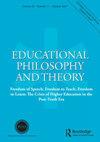从阿基米德点到沙圈——后可持续课程与批判主体
IF 1.8
4区 教育学
Q2 EDUCATION & EDUCATIONAL RESEARCH
引用次数: 0
摘要
批判性思维(CT)经常被认为是可持续发展课程的关键能力。在这种背景下,我们的时代经常被诊断为“后真理”,表明了一种认知上的担忧。然而,教育中新兴的“后可持续”观点表明,环境危机正在引发越来越多的生存问题,这可能部分解释了为什么简单的意识提升有时会遭到否认或未能促进可持续行动。为了克服这一挑战,我们对CT和许多课程思维中所假定的现代(个体的、理性的、自主的)主体性进行了哲学批判。我们遵循“本体论转向”,其中批判性意味着对自己在世界中的存在的自我反思质疑。一个尖锐的问题涉及能源,特别是化石燃料,它构成了现代批判性主体性的自主经验的大部分,同时也危及了同一主体性的未来前景。学校的气候罢工和黄背心运动以各自的方式表明,有生态问题的化石燃料如何将现代理性扭曲到不可预测的方向。比喻阿基米德和他的“沙子里的圆圈”表明了面对后可持续性的批判性思维的脆弱性。这种脆弱性应该在课程理论中得到解决,因为它是相互依赖的人,而不是独立的主体,他们对可持续的转变和行动持开放态度。本文章由计算机程序翻译,如有差异,请以英文原文为准。
From the Archimedean point to circles in the sand—Post-sustainable curriculum and the critical subject
Critical thinking (CT) is frequently mentioned as a key competence in sustainability curricula. In this context our era is often diagnosed as being ‘post-truth’, indicating an epistemic concern. However, emerging ‘post-sustainable’ views in education indicate that environmental crises are posing increasingly existential concerns, which might partly explain why simple consciousness-raising sometimes faces denial or fails to promote sustainable action. To overcome this challenge, we undertake a philosophical critique of modern (individual, rational, autonomous) subjectivity assumed in CT and much of curricular thinking. We follow the ‘ontological turn’ where criticality means self-reflective questioning of one’s own being-in-the-world. One acute question concerns energy, especially fossil fuels, which constitute much of the autonomous experience of modern, critical subjectivity, while simultaneously endangering the future horizon of that same subjectivity. Climate strikes at schools and the yellow vest movements indicate, in their own ways, how ecologically problematic fossil fuels are bending modern rationality into unpredicted directions. Metaphoric Archimedes and his ‘circles in the sand’ demonstrate the vulnerability of critical thought facing post-sustainability. This vulnerability should be addressed in curriculum theory, since it is interdependent persons—rather than independent subjects—who are open to sustainable transformation and action.
求助全文
通过发布文献求助,成功后即可免费获取论文全文。
去求助
来源期刊

Educational Philosophy and Theory
EDUCATION & EDUCATIONAL RESEARCH-
CiteScore
4.20
自引率
15.00%
发文量
171
期刊介绍:
Educational Philosophy and Theory publishes articles concerned with all aspects of educational philosophy. It will also consider manuscripts from other areas of pure or applied educational research. In this latter category the journal has published manuscripts concerned with curriculum theory, educational administration, the politics of education, educational history, educational policy, and higher education. As part of the journal''s commitment to extending the dialogues of educational philosophy to the profession and education''s several disciplines, it encourages the submission of manuscripts from collateral areas of study in education, the arts, and sciences, as well as from professional educators. Nevertheless, manuscripts must be germane to the ongoing conversations and dialogues of educational philosophy.
 求助内容:
求助内容: 应助结果提醒方式:
应助结果提醒方式:


